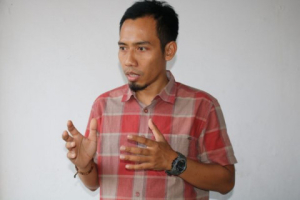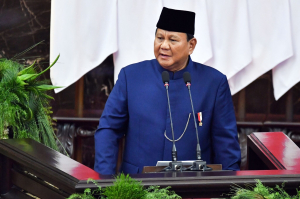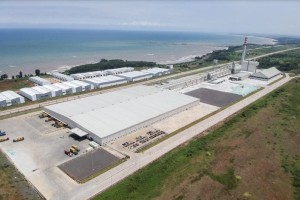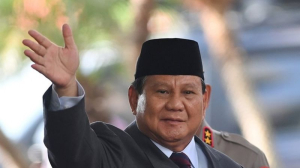Indonesia, ASEAN strategize to tackle U.S. tariff hike, boost agricultural imports
Coordinating Minister for the Economy, Airlangga Hartarto, has hinted at Indonesia's strategic approach to the recent increase in U.S. tariffs under President Donald Trump’s administration, citing measures to enhance agricultural imports from the U.S. to balance the trade deficit and strengthen bilateral relations.
Indonesia’s economy continues to show resilience, growing at 5.03 percent with provinces, such as Papua Barat and Maluku, performing above the national average. With inflation under control at around 1 percent, the country’s fundamentals remain strong despite the challenges posed by rising U.S. tariffs, while consumer confidence remains high, and exports, particularly to China and India, continue to support economic stability.
Airlangga emphasized that the impact of the U.S. tariff hike on Indonesia’s economy will be minimal as exports to the U.S. account for only 2.2 percent of GDP.
”While sectors like textiles and footwear will experience some cost increases due to tariffs, Indonesia’s competitive tariff structure in these sectors gives us an advantage over other ASEAN nations. Additionally, strategic products like gold, copper, and furniture remain unaffected by higher tariffs due to ongoing trade tensions between the U.S. and Canada,” he told an economic symposium in Jakarta on Tuesday, April 8, 2025.
In response to these external challenges, Indonesia has adopted a multifaceted strategy. ASEAN's collective stance is also vital, as the region is the second-largest contributor to the U.S. trade deficit after China.
Airlangga cited that Indonesia has actively pursued diplomatic channels, strengthening market access within ASEAN and negotiating favorable trade terms with the U.S., describing the recent visit by President Prabowo to Kuala Lumpur played a key role in aligning ASEAN's position on the U.S. tariffs.
As part of its economic strategy, Indonesia is also looking to expand its imports of agricultural products from the U.S., such as soybeans and wheat, which are not produced domestically. This move is aimed at addressing the agricultural trade balance and maintaining stable relations with the U.S., while ensuring that the country does not face higher import costs for these essential commodities.
The government plans to allocate resources more efficiently without increasing volume, ensuring that the state budget is not burdened. Furthermore, the government is implementing several domestic measures to mitigate the effects of the global economic uncertainty. These include economic stimulus packages, tax exemptions for labor-intensive sectors, and interest rate subsidies for SMEs. The mandate for export proceeds to return to Indonesia is expected to boost foreign exchange reserves, potentially increasing them by over US$100 billion.
Despite the global volatility caused by the U.S. tariff hikes, Airlangga said that Indonesia remains committed to strengthening its economic resilience through fiscal policies and international cooperation. ASEAN, as a strategic partner, will continue to be a key ally in facing these external pressures, with initiatives like CPTPP and other trade agreements offering further opportunities for collaboration.
In the coming days, President Prabowo is set to attend the ASEAN Trade Ministers’ meeting to address the implications of the U.S. tariffs and discuss regional strategies to support economic stability and growth.
Indonesia submissive stance
Muhammad Andri Perdana, an economist at the Center for Economic and Law Studies (Celios), expressed dismay over Indonesia's submissive stance.
"From Minister Airlangga's statements, it seems Indonesia would comply with any demands from the U.S. Trade Representative (USTR), even if it meant yielding to unreasonable requests. This is truly concerning," Andri said, highlighting a perceived lack of strategic defense in negotiations.
He reminded that the absence of a firm retaliatory option in Indonesia’s negotiations could embolden the U.S. to make increasingly unreasonable demands, not only in trade but across other political issues.
"Trump's tariffs have already caused harm to the global economy, but this situation shows how Indonesia and ASEAN are being forced into submission, which might only serve to further empower Trump’s negotiating tactics,” he said.
He pointed out that the U.S. administration, under former President Trump, has been successful in pressuring countries to make concessions through tariffs.
“Trump’s expectation was that countries would submit and provide concessions to avoid tariff increases, but this tactic can also backfire,” he said.
"If a country like Indonesia does not maintain the option of retaliation, the U.S. may continue to demand far-reaching agreements that go beyond trade matters," he added.
Andri noted that Trump’s strategy relies heavily on countries agreeing to tariffs as a trade-off, with the expectation that economic pain would drive nations into accepting more favorable terms for the U.S. However, should these nations, like Indonesia, stand their ground and retaliate, it could cause significant damage to the U.S. economy, something Trump would likely wish to avoid.
"The option of retaliation must always be on the table in any negotiation," he emphasized. "Indonesia needs to prepare a clear roadmap to diversify its trade partners and reduce its dependence on the U.S. This is crucial for safeguarding the country’s economic sovereignty."
As the Indonesian government continues to pursue diplomatic negotiations, Andri warns that the lack of a robust negotiating position could force Indonesia into increasingly disadvantageous agreements.
"The government must stand firm and retain all negotiation options, including retaliation, to ensure that Indonesia's economic interests are fully protected," he concluded.
Already have an account? Sign In
-
Start reading
Freemium
-
Monthly Subscription
30% OFF$26.03
$37.19/MonthCancel anytime
This offer is open to all new subscribers!
Subscribe now -
Yearly Subscription
33% OFF$228.13
$340.5/YearCancel anytime
This offer is open to all new subscribers!
Subscribe now






